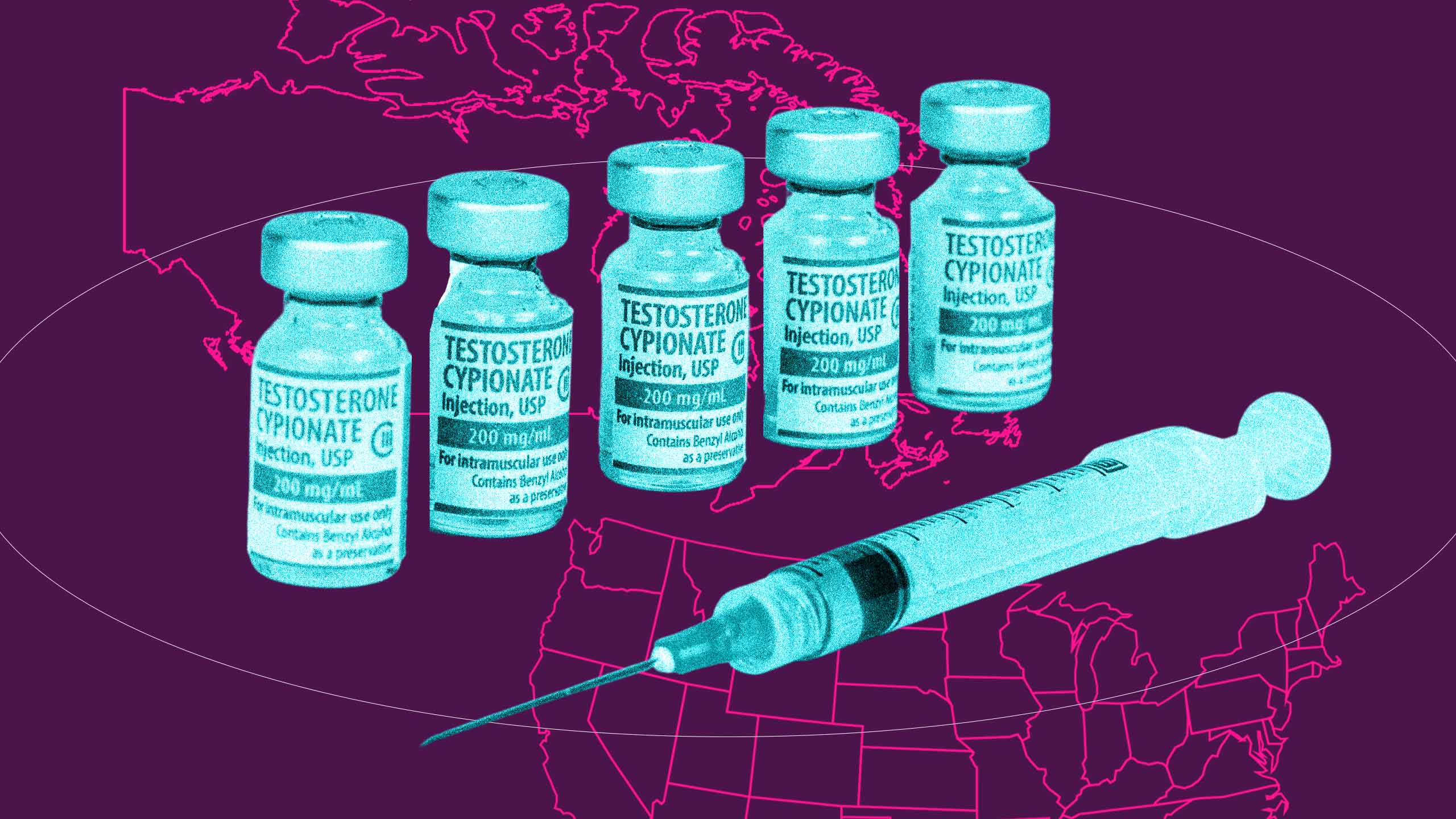Since the beginning of the COVID-19 pandemic, many trans people in the U.S. and Canada have been reporting testosterone shortages at their pharmacies.
Greyson Leigh is one of them. In December 2020, he went to his pharmacy in Calgary and was given Depo-Testosterone instead of his usual Delatestryl with no explanation. “This happened to coincide with me losing insurance, so I assumed at the time that I got switched to it because it was cheaper. I was hesitant at first because I was unsure if it was an allergy concern, but I tried it out and I didn’t notice any problems,” he says. He later learned he’d been switched due to a shortage of Delatestryl.
Then, at some point in spring 2021, he says he was informed the brand name Depo was also unavailable and received the generic Taro-Testosterone, a third type of injectable testosterone, instead. “I didn’t mind, since it was even cheaper than Depo and it seemed to agree with my body,” he says. Leigh continued on Taro for two years, even after getting new insurance.
“In early March this year, I went to fill my prescription, and the pharmacy called and said that Delatestryl was finally available again. They gave me that instead of Taro,” says Leigh. He says he found this “puzzling,” as he assumed the switch to Taro would be permanent.
Xtra spoke to a handful of other trans people who reported similar experiences with shortages and difficulty accessing specific brands of testosterone. Delatestryl, Taro-Testosterone and pms-Testosterone are among the brand names currently classified as experiencing a shortage.
“I went to renew my T in January and was informed there was a shortage,” says a source who asked to remain anonymous for privacy reasons. “They told me to phone around to other pharmacies to see if they had any in stock and they would transfer my Rx. But they doubted it because it had been weeks since they were able to get any.” Sure enough, the source says this effort was “futile.”
“They faxed my endocrinologist to get a substitute, but they were away for three weeks,” says the source. His endocrinologist’s office told the pharmacy to contact his GP or a walk-in clinic for an alternative.
“At this point, only gel was available, which is expensive,” the source continues. “The walk-in was full within 15 minutes of opening and it was weeks before an available appointment with my doctor.”
The source explains that a cis friend saw what he was going through and offered to mail him his testosterone and syringes. “My pharmacy is still out and it is on back order. And we are just hoping that by the time I run out of this vial from my friend, which will be in five weeks, they will have it again,” he says.
The shortages have understandably been a source of distress, and many people who rely on regular testosterone shots have questions about how to navigate periods of reduced access—and how long these periods are expected to last. Unfortunately, it isn’t easy to get answers from doctors, pharmacies or regulatory bodies like Health Canada. If you are affected or want to help a loved one, Xtra has attempted to answer some of the most frequent queries about testosterone shortages.
Why do testosterone shortages occur?
Xtra spoke with several health professionals, and many of them had theories about what may be causing testosterone shortages across the country. However, shortages occur at different times in different jurisdictions, and definitive answers about what causes each individual shortage are hard to come by.
Abbey Ferguson is the executive director of Halifax Sexual Health Centre. She says that testosterone shortages can be caused by the same factors that lead to other drug shortages—including difficulties sourcing the materials needed to formulate medication and labour concerns for production. In 2019 and 2020, drug shortages were reported for 29 percent of medicines sold in Canada.
Christina Antoniou, the director of corporate affairs for Pfizer Canada, confirmed that issues with the manufacturing process are affecting the supply of the pharmaceutical company’s testosterone products. “While we are not completely out of stock, we have limited supply due to ongoing manufacturing constraints,” she says. “As such, we have been carefully allocating the limited available supply to pharmacies and hospitals.”
“At this time, we cannot speculate on when this situation will improve,” continues Antoniou. “It’s important for patients who require this product to consult their healthcare professional to discuss their options.”
The lack of supply may also be affected by what Stan Van Uum, president of the Canadian Society of Endocrinology and Metabolism (CSEM), calls “rolling shortages.” Van Uum explains that when a person’s typical testosterone product is out of stock, pharmacies will often suggest they switch to a different product. “That supply gets used and depleted quicker than was anticipated at the time of planning, which then results in a shortage of that form.”
Van Uum says that, ultimately, CSEM relies on information about availability from Health Canada. CSEM has flagged the issue to Health Canada and hopes to meet with them soon.
While Xtra has asked Health Canada to comment on the reasons for the ongoing shortages, how widespread they are, and how long they may last, no response has been provided as of publication.
How do substitute prescriptions work?
As Van Uum pointed out, when one form of testosterone is out of stock, clinicians can typically provide prescriptions for other forms of testosterone that are currently available. For example, a patient who typically uses injectable testosterone may be switched to testosterone gel. “We’ve found that during shortages, [different forms of testosterone] weren’t necessarily all short at the exact same time,” Ferguson says.
Still, Van Uum cautions that switching to a different method isn’t possible for everyone. “Not every patient can switch to a non-injection form,” he says. Prescription drugs, for example, are not always covered by provincial insurance and gel is often more expensive than the injectable version—so a prescription can set you back roughly $70 to $180. Cost is dependent on the brand and the province you live in.
Van Uum says that since different testosterone products contain a higher concentration of hormones than others, there is a risk of incorrect dosage when switching. “You have to be very careful when you switch from one product to the other. Sometimes for the same dose, you have to change the volume you get.”
Is it safe to stop taking testosterone altogether?
For many people, missing a few doses of testosterone will not be life-threatening. But if a trans person has had their ovaries removed, stopping testosterone for several months could bring on symptoms of premature menopause, Amy Bourns, a family physician at Toronto’s Sherbourne Health Centre, which focuses on LGBTQ2S+ health, previously told Xtra contributor Krishna Rau. And for trans people with ovaries and a uterus, going off testosterone can mean a resumption of menstruation, which can cause changes in mood and energy levels.
For many, going off testosterone can reverse some of its masculinizing effects, such as muscle mass and fat redistribution. If someone goes off testosterone for years, it can result in loss of bone mineral density. Bourns said these factors could result in “depression, anxiety, intensified gender dysphoria and potentially unhealthy coping strategies like substance abuse.”
What options do people who take testosterone have during a shortage?
While reliable information is hard to come by, Van Uum says it’s important to keep as informed as possible in order to avoid panic. He recommends that those seeking the most up-to-date information on shortages check the Drug Shortages Canada website.
Ultimately, the ongoing testosterone shortage is a subject that is frustratingly difficult to learn more about. Until governments and health bodies step up to address shortages and be more transparent, it seems trans people are being left to advocate for their own health.


 Why you can trust Xtra
Why you can trust Xtra


